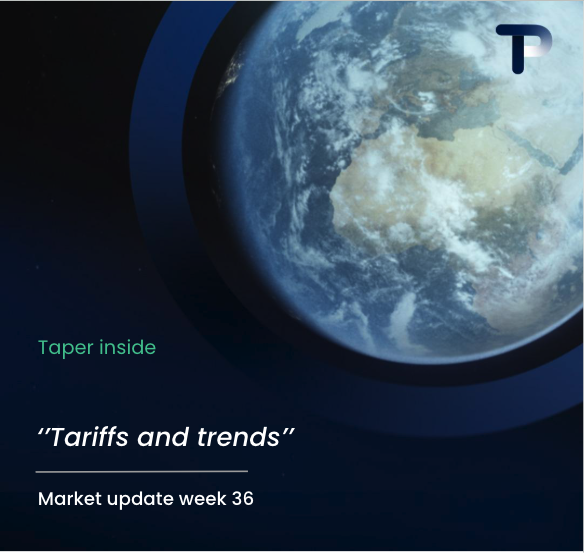Last week started with the dollar holding steady just below the 1.04 mark. On Wednesday, U.S. inflation data came in higher than expected. According to Donald Trump, the reason was obvious:

Personally, I found the explanation from Seema Shah, Chief Global Strategist at Principal Asset Management, more convincing:

Simply put: wages are rising, and since salaries went up last week, prices are also continuing to climb. On top of that, government policies could push inflation expectations higher. This might influence the Fed’s decisions because, as we know, if prices stay high, interest rates usually remain high too.
The impact on the dollar was clear as well: (photo 12.02.15.40)

Meanwhile, Trump didn’t hesitate to share his perspective once again: Interest rates should go down, even as he pushes for new trade tariffs. It’s worth noting that the Fed is supposed to operate independently of the president, so Trump doesn’t have any official influence over its decisions.

Finally, Friday was the most “hopeful” day for dollar buyers, as the USD took a significant hit, reaching 1.05. This drop was driven by U.S. retail sales coming in below expectations, marking the weakest figure in two years.

Industrial production also dipped slightly, mainly due to a drop in domestic auto production.

Overall, this was enough for the dollar to lose ground, dropping toward 1.05.

Then there’s Germany, where voters head to the polls on February 20. The AfD appears to be the biggest political gainer, polling at around 20% of the vote—though still trailing well behind the CDU/CSU.

We’ll have to wait and see, as protest votes are often underestimated in polls. With the recent attack in Germany on Thursday, it will be interesting to observe how voting behavior is impacted.
One thing is certain: Prime Minister Scholz is heading for a defeat. Under his leadership, the country’s economy has struggled to recover from the pandemic.

Meanwhile, the energy transition, which the government deemed a top priority, has left the country with an insufficient energy supply.

As a result, energy-dependent industries are directly affected, while the manufacturing sector, already facing challenges in the automotive industry, could be further impacted by potential Trump tariffs.

However, when it comes to national debt, there appear to be opportunities for the government to stimulate the economy through additional borrowing.

Compared to other major countries, both the current level and projected growth of public debt in the coming years remain low. To take advantage of this “borrowing capacity,” however, a new government would need to unite and amend the legal standards governing borrowing.
In short, Scholz is headed for a major defeat, and the election is likely to serve as a protest vote against the rise in migration seen in recent years. The AfD’s influence will become clearer after Election Day, particularly if constitutional changes come into play.
A realistic scenario, however, is a long and difficult road to decision-making. While only a 51% majority is required to form a government, constitutional changes demand a two-thirds majority in both chambers of parliament. As a result, a strong AfD showing could jeopardize efforts to amend the constitution, such as easing borrowing limits to address the debt burden.
Next, we turn to the unfolding trade war, where tensions have escalated following Trump’s latest announcement of “reciprocal tariffs.” In response, Ursula von der Leyen, speaking on behalf of the EU, stated:
“The EU will react firmly and immediately against unjustified barriers to free and fair trade, including when tariffs are used to challenge legal and non-discriminatory policies.”
Expect more noise from the U.S. in the coming days, with potential market reactions from both the EUR and USD, depending on how the situation develops. Trump’s statements on Thursday hinted at additional tariffs on automobiles, semiconductors, and pharmaceutical products. Notably, further details on auto tariffs are scheduled for release on April 2.
As for the economic calendar, the week is relatively quiet. The focus will be on U.S. data releases on Wednesday, including Building Permits and Housing Starts, which should offer insights into the real estate market. Additionally, the inflation report will be closely watched for obvious reasons. Finally, investors will carefully analyze the FOMC minutes from the last Fed meeting to better understand the central bank’s policy outlook.
In Europe, all eyes are on Germany. Alongside the political developments ahead of the election—which will surely bring more headlines—we will see key economic indicators from the country this week. On Tuesday, the ZEW Economic Sentiment Index, published by the German research institute, will offer insights into economic expectations. Then, on Friday, we’ll get the flash estimates of the HCOB Manufacturing PMI, which reflects manufacturing activity based on surveys conducted by Hamburg Commercial Bank.
Meanwhile, attention remains on the latest round of Trump’s tariffs, which, at first glance, seem to spell trouble for Germany’s automotive industry.

Finally, from the UK, we begin Tuesday with the release of unemployment figures, followed by most of the key economic updates on Friday, including GDP, consumer confidence, retail sales, and PMI data. However, when analyzing the cumulative job losses this year, it becomes clear that the situation is actually worse than last year.


There could still be some (negative) surprises. After the Economically Troubled Island announced minimum wage increases in April and Chancellor of the Exchequer Rachel Reeves introduced £26 billion in new taxes, employers sounded the alarm. So far, these concerns haven’t materialized, but we remain cautious about the risk of disappointing figures.
In short, this week brings a fresh round of tariff talk from Donald Trump, potential developments toward peace in Ukraine, a wave of economic data from the US and UK, and an upcoming election in Germany.
That seems like more than enough for one week!
If you have any questions, don’t hesitate to reach out.
Here’s the weekly agenda:
This Week’s Agenda:
Monday
- Japan – Preliminary GDP Growth
Tuesday
- UK – Unemployment Rate
- Germany – ZEW Economic Sentiment Index
Wednesday
- Japan – Trade Balance
- US – Inflation Rate
- US – Building Permits, Housing Starts, FOMC Minutes
Thursday
(No scheduled events)
Friday
- Japan – Inflation Rate
- UK – GfK Consumer Confidence, Retail Sales, PMI Figures
- Germany – HCOB Manufacturing PMI (Flash)



